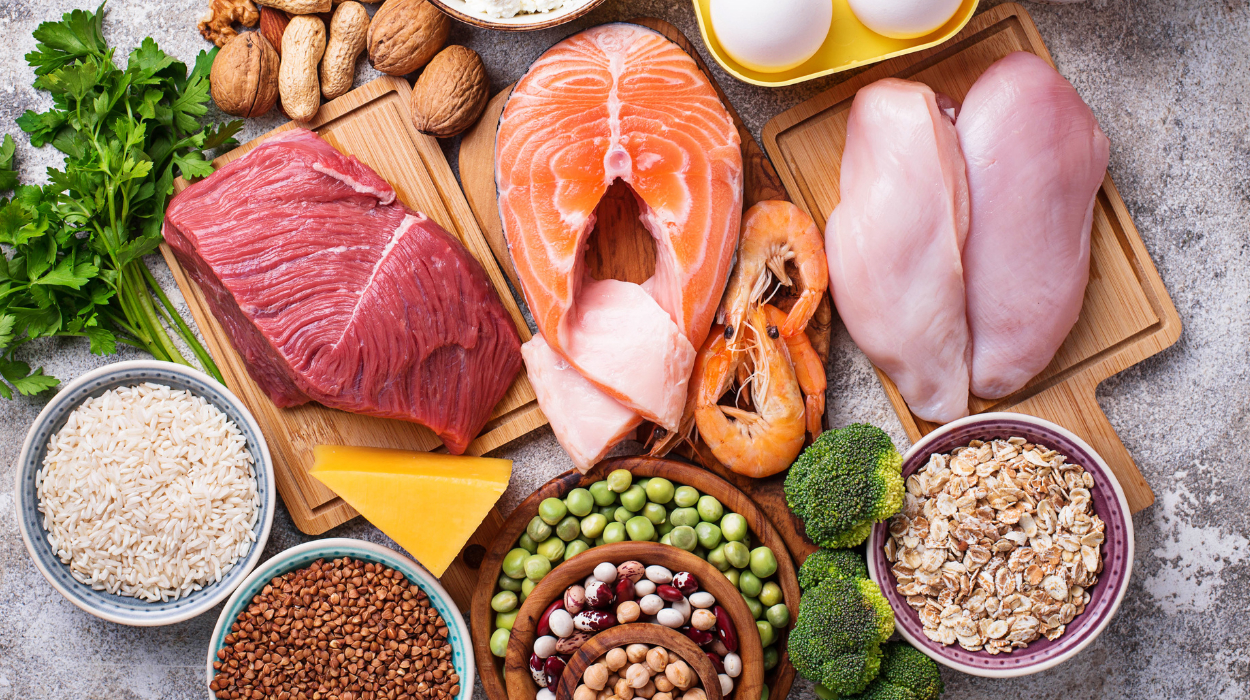If you’re looking for tips for losing weight, you probably want to know how to get it done fast. After all, you want to look and feel your best as soon as possible.
It’s natural to want to experience fast weight loss, but to lose weight safely, you need to give yourself time. Sustainable weight loss typically happens slowly. Some cannot wait and choose to add a fat burner to their regimen.
Check out the tips below for advice on how to lose weight in a month. For the best results, you should continue to follow this advice for several months.
How To Lose Weight In 30 Days
If you want to start losing weight in a month, follow these tips:
- Step 1: Cut your calories.
- Step 2: Get some exercise.
- Step 3: Increase your water intake.
- Step 4: Prioritize sleep.
- Step 5: Cut back on salt.
- Step 6: Increase protein intake.
- Step 7: Take a walk.
Best Ways To Lose Weight In 30 Days
Weight gain can be frustrating, and for some people, it might even lead to health problems. So, it’s only natural to want to drop extra weight. Successful weight loss takes time, but you can get off to a good start in just a month.
Consider the tips below if you’re wondering how to lose belly fat in 30 days.
Cut Your Calories
To lose weight in 30 days, you must be in a calorie deficit and follow a healthy diet. This means you’re consuming fewer calories than you burn off every day.
Calorie needs vary, but experts generally recommend[1] a deficit of 500 to 1,000 calories per day to lose weight. You can use a calories burned calculator to estimate how many you’re burning daily.
Once you have an estimate of your daily calorie burn, follow a low-calorie diet to lose weight. There are about 3,500 calories[2] in a pound of fat. So, if you’re in a deficit of 500 calories a day, you’d lose about a pound a week.
The quickest way to lose weight in 30 days is to simply cut your calories. If you’re truly in a deficit, you will experience fat loss.
Get Some Exercise
Lowering your calorie intake is necessary for weight loss, and exercise can make it easier to maintain a calorie deficit. Exercise burns calories, which will create a larger deficit.
Various types of physical activity can be beneficial for weight loss. Sprint intervals can be especially effective for fat loss if you’re trying to be efficient. According to a systematic review, sprint workouts lead to increased metabolic rate[3] for several hours after exercising.
So, when you do sprint workouts, fat burning will be higher during the workout and afterward. Warm up with five minutes of walking to do this type of workout, then begin sprint intervals. This could involve running at a sprint pace for one minute, then recovering with a two-minute walk.
In addition to sprinting, adding some resistance training to your routine is also helpful. Research has shown that resistance training, also called weight training, can boost metabolism. On average, weight training boosts resting metabolism by about 5%,[4] so you’ll burn more calories daily.
Choosing a combination of sprint training and weight lifting could help you lose weight.
Increase Your Water Intake

It isn’t always easy to follow a low-calorie diet; finding tricks, like increasing water intake, is helpful.
A clinical trial found that those drinking water before a meal reduced calorie intake[5] more than those who did not consume any. Even though these people ate less, they felt just as satisfied as if they ate more.
These results suggest that consuming water can help you to feel satiated, making it easier to stay in a calorie deficit.
Another consideration is that water is calorie-free compared to high-calorie sugary drinks. If weight loss is your goal, replacing sugary drinks or calorie-containing beverages with water can help.
Drink water before a meal if you are tempted to return for seconds.This will keep you fuller, so counting calories isn’t as difficult. Water can also be a great way to reduce calories if you’re used to drinking caloric beverages like fruit juice.
Prioritize Sleep
Sleep deprivation isn’t a good recipe for weight loss. In fact, lack of sleep could cause weight gain, as studies have found[6] insufficient sleep is linked to a higher BMI and calorie intake.
On the other hand, getting enough sleep can benefit weight loss. One study[7] found that people who slept eight to nine hours daily had the lowest BMI.
Other research[6] has shown that people lose more fat when they spend 8.5 hours a day in bed. This is in comparison to spending 5.5 hours per day in bed.
The bottom line is that sleeping too little comes with consequences. You need to make time for sufficient sleep to meet your weight loss goals. This will prevent you from overeating to cope with fatigue.
Cut Back On Salt
If you’re looking for tips on how to lose weight in four weeks, you’re probably interested in efficient weight loss. While rapidly losing weight isn’t healthy, you can safely drop some water weight in a month.
One way to drop excess water weight is to avoid eating high-sodium foods. Excess sodium causes the body to retain more water,[8] leading to weight gain. By cutting sodium, you can shed water weight and reduce bloating.
Packaged foods tend to be high in sodium, so check food labels. Government guidelines state that Americans should limit themselves to 2,300 milligrams[9] of sodium each day. The average person consumes 3,400 milligrams[9] a day, so your intake is probably too high if you’re in the majority.
Be mindful of your sodium intake during your weight loss journey. Salt is found in many foods, such as canned, frozen, sauces, soups, and even baked goods.
Increase Protein Intake

Protein can have fat-burning effects. This is because it increases[10] your resting metabolism, especially when sleeping. Protein has this effect because it increases muscle mass,[11] speeding metabolism.
Protein is also important for weight loss maintenance because it preserves[10] muscle mass. This keeps your resting metabolic rate high, even after you lose weight.
To take advantage of these effects, follow a high-protein diet while you’re trying to lose weight. The average person needs about 1.2-1.5 grams[12] of protein per kilogram of body weight daily, depending on their physical activity level. Choose plenty of lean proteins, and track your daily protein intake to ensure it’s sufficient.
Increased protein intake makes you likely feel satisfied[10] after your meals. This will keep you from overeating, so you can stick to lower calorie intake.
Take A Walk
If you’re looking to burn extra calories but are not a gym fan, walking can help. A meta-analysis[13] of peer-reviewed studies found that walking leads to fat loss and total weight loss among women.
Walking is a simple exercise method when you’re following a weight loss program. You can walk indoors on a treadmill or outdoors around your neighborhood. You won’t need any fancy equipment, nor will you have to follow a complicated plan.
Another nice thing about walking is that it easily fits into your schedule. You can walk on your lunch break at work or around your neighborhood after dinner. If you’re short on time, you can take two short walks daily to fit in your steps.
Things To Consider
If you’re looking for tips on how to reduce weight in 30 days, you’re in luck. You can lose weight in a month with dietary changes that lead to lower calorie intake. It’s also essential to exercise to burn more calories.
Beyond the steps above, there are additional tips to consider when trying to lose fat. Consider the factors below, all of which can influence body weight.
Healthy Stress Management
First, managing stress can be critical to a successful weight loss plan. When you’re stressed, you’re more likely[14] to experience poor sleep and food cravings. You’re also at risk of increased appetite, which makes weight loss harder.
Keep stress levels at bay by taking plenty of time to rest and relax. Don’t feel guilty about saying no to extra responsibilities. Instead, set aside time to do relaxing activities like yoga or reading.
Choose Healthy Behaviors
When trying to lose weight, your overall health is also important. You might be tempted to follow a restrictive diet and overuse diet pills, but this isn’t the best choice.
You might even be tempted to try skipping meals to help you lose weight. Unfortunately, this is likely to backfire and lead to binge eating.[15]
Rather than crash dieting and skipping meals, start the day with a healthy, high-protein breakfast. Eat healthily for the rest of the day, and be mindful of calories.
Be sure not to cut calories too low. Extremely low-calorie diets can lead[16] to malnutrition and deficiencies in vitamins and minerals. Taking a multivitamin supplement might be advisable if you are cutting calories.
Cut Out Alcohol
Experts recommend reducing or cutting out alcohol when you’re trying to lose weight. Alcoholic drinks add extra calories with no nutritional value.
In addition, alcohol consumption is associated with higher calorie intake. Following an episode of drinking, it can be difficult to control food intake. This leads to overeating,[17] which interferes with weight loss.
If you regularly drink alcohol, cutting it out can help you lose weight. One study[18] found that when people cut out alcohol for 40 days, they dropped body fat. The average weight loss was nearly 6 pounds[18] among study participants.
Choose Intuitive Eating
If you’re struggling with your weight, you might have become accustomed to overeating. This could involve eating to cope with stress or simply being unaware of your hunger signals. If this is the case, becoming more mindful about your eating habits may offer a solution.
Intuitive or mindful eating teaches you to become more aware of your body’s hunger and fullness signals. Research shows[19] that when people practice intuitive eating, they are less likely to binge. They are also at lower risk of unhealthy habits like skipping meals and vomiting to control weight.
Eating slowly and paying attention to when you feel full and satisfied can help you eat more intuitively. This strategy can reduce overeating and makes it easier to stick to a calorie deficit.
How Much Weight Can You Lose In 30 Days?
It is common for people to want to lose 10 pounds in 30 days, but this isn’t always realistic. Experts recommend losing 5–15% of body weight[1] over six months. This is considered both healthy and realistic.
Using this guideline, a 200-pound person could lose 10 to 30 pounds over six months or as much as 5 pounds a month. A person with a higher starting weight could drop more weight in this time period.
Ultimately, the amount of weight lost depends on how large your calorie deficit is. Nutrition experts have stated that a deficit of 600 calories[1] a day is ideal. This would lead to a weight loss of 5 pounds per month.
With a larger deficit, you will lose more weight in 30 days, but more significant deficits aren’t always sustainable.
30-Day Diet Plan
If you’re looking for a free weight loss plan, the tips here can be helpful. While this isn’t a specific diet plan, it provides general guidelines for losing weight over a month.
Use these tips[1] to create a 30-day diet:
- Reduce your calorie intake by cutting out fatty, high-calorie snacks and foods.
- Avoid sugar-sweetened beverages.
- Choose low-fat dairy products and meats rather than high-fat versions.
- Increase the amount of vegetables, legumes, and beans in your diet.
- Limit or avoid snacking and late-night eating.
- Eat more seafood for healthy fat.
Final Thoughts
By cutting calories and making time for exercise, you can lose weight in 30 days. By prioritizing sleep and getting quality protein, you can engage nutritional strategies to produce the best results.
While you can lose some weight in a month, it’s important to be realistic. Slow, steady weight loss is the most healthy and sustainable. You must continue these habits for longer than a month for significant weight loss.
Frequently Asked Questions
Losing 10 pounds in one month means losing about 2.5 pounds a week. This would mean a deficit of about 1,250 calories a day. You would need to restrict calories and exercise excessively, which may not be sustainable.
Losing 30 pounds in 30 days is not advisable, and it’s likely impossible. This would mean losing a pound daily, requiring extreme dieting and excessive exercise.
Drinking water before a meal has been found to reduce calorie intake during the meal. Drinking water could, therefore, help you lose weight by leading to a caloric deficit.
Research[13] has shown that walking benefits women’s fat loss. You can’t control where you lose fat. However, combining walking with a calorie deficit could help you lose belly fat.
 Evidence Based
Evidence Based
